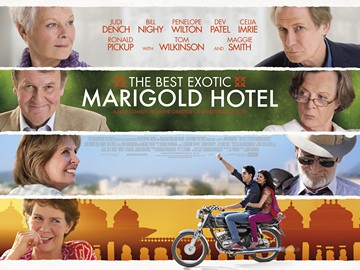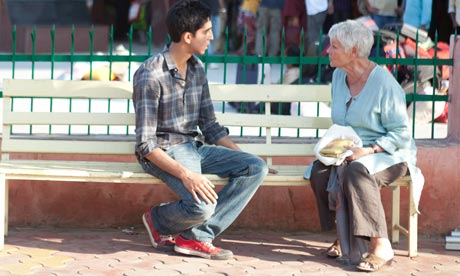 The Best Exotic Marigold Hotel is a coming of age story in a
rather unlikely way. Its main characters
are not novice youngsters or young adults feverishly searching for their life’s
purpose in the many daunting years ahead of them. Hardly.
Instead, the characters that make up this story are all well over the
hill and have had plenty of that kind of life experience. But despite its displacement in the traditional
sense of that genre, The Best Exotic Marigold Hotel basks in the seemingly
youthful splendor and energy of a coming of age story.
The Best Exotic Marigold Hotel is a coming of age story in a
rather unlikely way. Its main characters
are not novice youngsters or young adults feverishly searching for their life’s
purpose in the many daunting years ahead of them. Hardly.
Instead, the characters that make up this story are all well over the
hill and have had plenty of that kind of life experience. But despite its displacement in the traditional
sense of that genre, The Best Exotic Marigold Hotel basks in the seemingly
youthful splendor and energy of a coming of age story.
Immediately, the audience receives a crash course of introductions
by way of the film’s seven main characters, all living in various parts of
England, all unknown to each other’s own existence. There’s the newly widowed housewife, Evelyn
(Judi Dench), looking to sell her home and pay off her family’s debts; another
woman, Muriel (Maggie Smith), in need of an affordable hip replacement (who is
also racist); a judge by the name of Graham (Tom Wilkinson), who has been
telling himself for years he will soon retire; Norman (Ronald Pickup), a single
man of the Don Juan type always looking for some fun under the sheets despite
his old age, Madge (Celia Imrie), a woman of similar stature that, despite a
few unsuccessful marriages, still hopes to be swopped off her feet by a beloved
Prince Charming. And then there’s the
groups’ only married couple, Douglas (Bill Nighy) and Jean (Penelope Wilton), who
still appear much too young for their retirement community home, fit with too
many handrails and an emergency button- but it’s all they can afford. What groups these people together is the tight
budget they must plan their retirement on, making this comfort that much harder
to attain. The introductions become
hectic at first and almost too much too soon, but through each of their three
minutes of screen time, we see that none of these folks are cinematic
caricatures. Each one is cleverly thought
out and totally real. No doubt there is
a lonely Evelyn and a feisty old Norman out there in our world. Their individual stories make the film much
more real and relatable. In their own
ways, each character is trying to re-attain the peace of mind they had from
years prior and this subsequently takes them to the same destination- India,
where they all meet.

With over 1.2 billion people, the movie does an excellent job capturing the organized confusion that defines India. Brilliant colors cram the frame and it becomes a joy to sit there and stare- thankfully not having to actually deal with the ensuing chaos we witness. Their residence at The Best Exotic Marigold Hotel “for the elderly and beautiful” is managed by an exuberant young manager, Sonny Kapoor (Dev Patel, formerly seen in SlumdogMillionaire). The hotel’s dilapidated condition, not as advertised in the brochure, comes as a shock to the residents and becomes one of the discomforts of India. Nonetheless, Sonny assures them that the brochure holds his image for the hotel’s future, remaining blissfully optimistic despite their many complaints.
Sonny’s genuine and bright persona drives the film and its
characters, forcing the more reclusive ones out of any comfort zone they hope
to have. It’s a clash of cultures and a
clash of ideals for these seasoned travelers, some more open to it than
others. Muriel’s hip replacement and
recovery confines her to the hotel, but it is her racism that really underscores
her ability to seek adventure in this new land.
Jean, also tentative to leave the hotel, spends her days reading in the
hotel’s courtyard. Their complaints are
many, from the food to the smell and it is almost sad as we see them belittle Sonny’s
every attempt to make for them a hospitable environment.
While his wife Jean prefers books, Douglas pleasantly dives
into everything India has to offer traveling to various temples and other
cultural high points, sometimes in the company of Evelyn, who shares his enthusiasm. In a similar way, Graham, who lived in India
for his first 18 years, seeks to revive the memories of the delightful
childhoods he once had before a mistake of his own forced him and his family to
relocate back to England. His story is
the most touching and his efforts are truly triumphant.
But he is not the only character we hope for. Despite the nagging pessimism from Muriel and
Jean, they too are struck by the magic and wonder of Indian culture, just as we
are from the comfort of our seats. The Best Exotic Marigold Hotel has a full range of emotions. While much
of it comes as a truth-seeking life manifestation, the film certainly has no
shortage of laughs either. Norman’s attempts
to woo women are some of the film’s funniest and most memorable sequences. In all, this is nothing but a splendid film,
with a warm heart and a provoking intelligence too.
 The movie’s philosophy is often very externalized, whether
it be through character conversations or Evelyn’s journal entries. But if you’re not careful, the words might
easily slip past and this would be a shame because like all of the characters
in the movie, we too can learn a thing or two about living from others. For the most part, these lines usually come from
Sonny, Douglas or Graham trying to bestow some thoughtful suggestions to the
less enthused friends. However, in a few
touching and heartfelt instances, this
common practice gets reversed as some of the most unsuspecting characters come to
the help of those they initially wanted no part of a few days prior.
The movie’s philosophy is often very externalized, whether
it be through character conversations or Evelyn’s journal entries. But if you’re not careful, the words might
easily slip past and this would be a shame because like all of the characters
in the movie, we too can learn a thing or two about living from others. For the most part, these lines usually come from
Sonny, Douglas or Graham trying to bestow some thoughtful suggestions to the
less enthused friends. However, in a few
touching and heartfelt instances, this
common practice gets reversed as some of the most unsuspecting characters come to
the help of those they initially wanted no part of a few days prior.
And if I could, as I sat slouched in my movie theater seat,
I would have written them all down. But
unfortunately that did not happen. Thankfully
though, some of these thoughtful words get repeated throughout the film, as if
the characters/director deemed them important and in need of reiteration whether
it’s for the characters’ sake or for our own.
And to end this I would like to share with you my favorite phrase and
probably the most important one from the film given to us by Sonny- “Everything
will be all right in the end... if it's not all right then it's not the end.”
No comments:
Post a Comment